- Home
- Peter Benchley
Peter Benchley's Creature Page 11
Peter Benchley's Creature Read online
Page 11
"But Dad . . ." Max was already unlacing his Rollerblades.
"Stay here!" Walking toward the clump of weed, Chase tried to recall if he'd heard of anyone reported missing. Then he wondered how long it took a drowned body to rise to the surface again. It happened, he knew that: after a while the gases in a body built up, and as they expanded, the corpse would float.
The clump of weed was huge, extending far out into the water. Chase didn't want to touch the hand—what if that was all there was to it, or what if there was more but it was so rotten that it fell apart?—so he used his running shoe to nudge aside the rubbery strands of weed.
He saw a head then, and what was left of a face, and bile rushed up the back of his throat and poured into his mouth. He dropped to his knees, coughing and spitting.
The skin was whitish gray; the eyes were gone, and the earlobes and the lips. There was more of the body snarled in the weed—no blood left in it, just shredded white flesh interlaced with strands of neoprene wet suit.
"Call the police," he said to Max. "Go down to Beach Street, the news office, and ask Earl to call the police."
"Who ... who is it?"
"I don't know."
"What happened?"
"Just go!" Chase said, and almost immediately he heard the rattle of Max's wheels on the pavement.
When he thought he could look again without retching, Chase crawled closer. The face was unrecognizable, but there was something familiar about the hand.
The watch. The watch on the wrist of the hand with the rigored claws was one of those diver's watches that did everything but rinse your socks—told the time in every zone on the planet, had windows for bottom time, lap time and phases of the moon. It was the watch of a gimmick freak, and he'd seen it before. But where?
It came to him: Waterboro Lumber, holding out a can of WD-40. He had remarked on the watch, and the owner had insisted on explaining every function and had told him how to order one.
Buck Bellamy, that's who it was. Could this be what was left of Buck Bellamy? But why? Buck was an expert boatman, a certified scuba diver, and in high school he'd been a competitive swimmer.
He had been diving, the wet suit was evidence of that. What could have killed him? Maybe he'd gotten bad air—people sometimes were careless about where they filled their tanks, and died of carbon monoxide poisoning. Maybe he'd had a heart attack or a stroke, or been chopped up by a boat propeller, or ... Christ knew what.
Chase peeled more of the weed away, and he saw the other arm. All the flesh between elbow and shoulder was gone, and there were deep gashes in the bone of the upper arm, as if a big fish or a small shark had grabbed the arm and shaken it back and forth and gnawed on it like a dog with a bone too big to crush.
Around the wrist was a thong, and attached to the thong was a steel housing containing a video camera.
"You tell me, Simon," said Police Chief Roland Gibson. "You're the shark expert. What kind of shark'd do a job like that?"
"None," Chase said. "None I know of. Not around here."
They were sitting in Gibson's office in the station house on Route 1. Polaroid pictures of Buck Bellamy's remains were spread out on Gibson's desk, and Buck's video camera was plugged into a television set in a bookcase.
A police car had arrived within five minutes, an ambulance a few minutes later, and by the time the body had been photographed and bagged and taken away to the medical examiner in New London, a small crowd had gathered by the stone wall.
At Gibson's request, Chase and Max had been brought to the station house, and their statements had been taken. Now Max sat in the lobby while Chase and Gibson talked.
"Nice, Simon," Gibson said. "First you tell me it looks like a shark attack, then you tell me there are no sharks around here that attack people."
"I didn't say a shark attacked him, Rollie, I said it looks like a shark might've bitten him . . . after Buck was already dead."
"What makes you think so?"
"Shark attacks are rare anywhere, and unheard-of around here. A man's got a better chance of being killed by a feral cat or a farmer's pig than by a shark. For one thing, there are damn few dangerous sharks in these waters. Sand sharks are bottom feeders; they'd never go after a swimmer, let alone a diver, but they might nibble on a dead body on the bottom. Makos are scarce, they're loners, and they live in deep water and follow schools of pelagics—tuna and jacks. The odds are a million to one against a mako wandering into shallow water, especially murky shallow water like around here. A blue shark's a possibility; a blue might make a run at a person if he was bleeding, and if a bunch of them went after someone, they'd rip him to pieces. But we'd see the evidence—the bite marks are obvious."
"What about white sharks? They're around, you've told me so yourself."
"Sometimes," Chase said, unwilling to tell Gibson about the big white he and Tall Man had tagged only last week. The last thing he wanted was a mass vendetta against white sharks by an armada of bloodthirsty macho loons. "But rarely . . . almost never. And, hell, if a great white shark had wanted to eat Buck, it would've eaten him. Period. If it had made a run at him by mistake, maybe thinking he was a seal— divers in wet suits on the surface look like seals to a shark—Buck would've probably been sheared in half. We might find the other half, we might not, but if we did, the bite marks would be definitive: big, nasty half-moons. We sure wouldn't find him with his throat torn out and meat bitten off him here and there like he'd been served up at a banquet."
Gibson paused. "I guess we have to wait for what the M.E. says. Maybe like you say, Buck just died. People do."
There was a rap on the door, and a patrolman stepped into the room. "They found Buck's brother, Chief," he said. He hesitated, then added, "Over on Seagull Point."
"What's the matter? You look awful."
"He's dead, too. Half et. Just like the other one. Like Buck. Only difference, this one, Brian, had a knife scabbard strapped to his leg."
"Just the scabbard?" Gibson said. "No knife?"
"Nope, the knife was gone. The scabbard had one of them rubber safety rings, too, so the knife didn't just fall out."
"Which means Brian had it out, in his hand." Gibson looked at Chase. "So much for natural causes, wouldn't you say?" He nodded to the patrolman. "Okay, Tommy."
"There's Nate Green out here wants to see you."
"Shit, I knew the fucking press would get onto this." Gibson sighed. "You might's well send him in, else he'll have it all over Connecticut that Hannibal Lecter's out there eating people." When the patrolman had left, Gibson said to Chase, "At least it's Nate and not some hotshot looking for a Pulitzer prize. I can keep Nate on the leash with an exclusive or two and a couple scotches."
Nate Green, a reporter for the Waterboro Chronicle, was a thirty-year veteran who had once wanted to work for a big-city daily but had finally reconciled his modest talent with a comfortable life by the seashore.
Green came into the room and closed the door behind him. He was in his mid-fifties: soft and overweight, drinker's veins crisscrossing his nose and cheeks like a road map.
"I hear we got some excitement," he said as he smiled at Gibson and shook hands with Chase and sat down in the empty chair facing the desk.
"Maybe," said Gibson. "Do me a favor, Nate. Let's not go jumping to any conclusions."
"I hear Buck had a video camera on him."
Gibson hesitated, then said, "Yeah, but it flooded, the tape got wet. Maybe one of my geniuses did it when they unloaded it, I don't know. Anyway, there's not much on it."
"Mind if I look?"
"Only 'cause I trust you." Gibson gestured to Chase, who got up and turned on the television set and pressed the "play" button on the video camera. "But keep all this to yourself. We don't know exactly what happened here."
"You know me, Rollie," said Green.
A blurred image of Brian Bellamy came on the screen, the tape flickering and jumping as if the signal wouldn't lock in. He seemed to be holding somet
hing up to the camera. They heard Buck's voice telling Brian to smile. Then Brian's face changed. His eyes popped wide and his mouth opened and he dropped whatever he was holding and shouted something incoherent.
"Looks like he's seen something," said Green.
"Yeah," Chase said, "but what?"
They heard Buck say, "Brian! Goddamnit!"
"Listen to that," said Gibson. "Buck's cussing him, like maybe Brian started screwing around ... or went apeshit."
Suddenly the camera zoomed in on the sand bottom, and the screen went dark. There were sounds of shouts and screams, and the camera jolted up again, whirling around in a cloud of fuzz. The water seemed to take on a greenish tone.
"What's that?" Green asked.
"Could be blood," Chase said, "depending on how deep they were. Below thirty-three feet, blood looks green."
The camera fell to the bottom again, more lazily, as if it had been dropped, and all that filled the screen was water.
There was one last word, a voice yelling, "No!"
Green said, "Who was that?"
Chase said, "We don't know."
"Run it again for me, Simon," Gibson said. Chase rewound the tape and played the scene again. When it was over, Gibson said, "Looks to me like maybe Brian killed Buck."
"Then what killed Brian?" asked Chase.
"Could be they killed each other."
Green shook his head. "Doesn't make any sense. They were as close as brothers can be. Brian worshiped Buck. Why would he kill him?"
"Drugs," Gibson said. "Brian had a history. Could be he had a relapse and wigged out."
"No, Brian was scared to death of drugs. He went to every N.A. meeting he could find, and if there wasn't one, he'd go to A.A. or Al-Anon . . . even church if he had to. I remember one day I was getting gas, he told me he'd already killed so many brain cells, he was taking care of the ones he had left. A beer now and then was all he ever allowed himself. The Bellamy boys kill each other? No, Rollie, it makes no sense at all."
"You got any better ideas?" Gibson leaned back in his chair and stared at the ceiling.
"Just a mystery, I guess," Green said. "Mysterious death always makes good copy."
"Scares the shit outta people, too," Gibson said.
After a long moment, Gibson made a show of looking at his watch, and stood up. "Speaking of killing brain cells . . . it's only nine-thirty in the morning, and already it's been one long sumbitch of a day." He took a key from his pocket and opened the bottom drawer of a file cabinet, pulled out a bottle of scotch and a stack of paper cups and returned to his desk. He poured two inches of whisky into a cup, passed it to Green, poured another and offered it to Chase, who shook his head. Then he took a sip himself and again leaned back in his chair. "You got people coming in for the Blessing of the Fleet, Nate?"
"My sister and her kids. They'll probably find some excuse to hang around for a week." Green sipped his drink. "Jesus."
Chase didn't know why Gibson had suddenly started talking about the Blessing, but he didn't want to hear about it. He wanted to find Max and return to the island and get to work. He leaned forward as if to rise, started to say something, but Gibson cut him off.
"They say this'll be the biggest Blessing ever, folks coining in from everywhere, specially now the casino gives 'em something to do if it rains and at night."
"So they say," said Green.
"Could give us a real shot in the arm."
"Uh-huh."
Now Chase realized what Gibson was doing, and he knew he'd have to sit there and listen.
"Now, Nate," Gibson said, "I know you have to fill all those column inches, so whyn't you let Simon and me give you a hand with the logic?"
"Okay."
"First off, there's no way this was a shark attack. Simon as much as gave me a deposition about that. Right, Simon?"
"More or less," said Chase. "I said—"
"And the tape," Gibson said to Green. "Remember, you're the only one's seen it, that's an exclusive, and you'd have to agree it sure looks like Brian just suddenly went ape."
"Or saw something that made him go ape."
"Saw what? The Ghost of Christmas Past?" Gibson barked out a laugh.
"Well, that's the question."
"Here's my point: nothin' down there to see. The only conclusion a reasonable man can reach is that Brian had an acid flashback or something and went after Buck and got himself killed, too, in the process."
"Where's all the blood come from?"
"Brian's knife."
"Brian had a knife?"
"Sure," Gibson said. "Didn't I tell you that? Strapped to his leg. But when they found him, the knife was gone. There's another exclusive for you."
Green set his cup on the desk and turned to look at Chase. "What do you think, Simon?"
"I don't know what to think," said Chase. "But it all seems a little—"
"You got a better explanation?" Gibson snapped at him.
"No," Chase said, for he didn't. All he would swear to, if it ever came to that, was that neither man had been killed by a shark ... at least not by any shark he had ever heard of. .
"There you have it then, Nate," said Gibson. "You're too good a reporter to go off half-cocked with a lot of dingbat speculation."
Green paused, then said, "You'll let me know what the M.E. says?"
"Soon as he certifies the cause of death." Gibson splashed more whisky into Green's cup. "But I'll bet a dollar to a dime it'll be death caused by a sharp instrument. Seems to me one lesson to pass along to your readers is, drug addicts and maniacs shouldn't go diving."
The patrolman rapped on the door again, opened it and said to Chase, "There was a call for you."
"I'll take it outside," Chase said, standing up.
"No, she's gone," said the patrolman. "It was Mrs. Bixler. She said to tell you the Little Mermaid's arrived."
"Good. Thanks, Tommy." Chase said to Gibson, "Three months' reprieve from debtor's prison ... I hope." He turned to go.
"Simon . . ." Gibson said, stopping him. "We're all agreed here, right? I mean, in case one of those half-ass TV reporters calls you and wants to make a big deal out of this."
"Sure, Rollie."
"Good." Gibson smiled. "Your institute's getting a real good reputation. You wouldn't want to muddy it up by poking around in police business."
Chase left the room with an uneasy feeling; by the time he reached the lobby, he was sure he had just been threatened.
The patrolmatn was waiting in the lobby with Max, ready to drive them back to their boat.
"There was one of your buoys about a hundred yards from where they found Brian," the patrolman said. "Length of rubber wire, some electronic thing on the end. I told 'em to leave it there, you could pick it up on your way home."
"Thanks," Chase said. "It must have sprung loose from whatever it got snagged in."
When they were in the car, Max leaned forward from the backseat and said to Chase, "I found her."
"Who?"
"The girl. The one I almost hit."
"What d'you mean, you found her?"
"In the newspaper back there, while I was waiting. There was a picture, some prize she won. And I knew there had to be a reason why she didn't hear me coming. She's deaf."
"Who is she?"
"Her name's Elizabeth."
18
CHASE slowed the Whaler as he approached the tip of the low spit of land called Seagull Point, and turned toward shore so he could cruise close to the beach. Brian's body had been found about halfway down the peninsula; Chase's wire should be just this side of the spot, or just beyond.
Max stood in the bow, steadying himself with a rope attached to a cleat. "What'll it look like?" he asked.
"Against that white sand," Chase said, "it should stand out like three hundred feet of black snake?"
Seagull Point had once been private property, then a state beach; now it was a bird sanctuary. Gulls bred there, and terns, and though people sometime
s beached their boats to swim or picnic, anyone who ventured inland beyond the dunes risked scalp lacerations from being dive-bombed by birds protecting their nests.
Chase could hear the birds screeching at one another, and saw them circling over their nests, but he noticed that there were none diving or floating on the water. He wondered why. Usually, on a day this calm, dozens of birds would be sitting on the surface, waiting for a signal from sentinels overhead that schools of baitfish were on the move.
"Look!" Max said, pointing off the starboard bow.
Chase turned, following Max's gesture, took the boat out of gear and let it coast. He saw something white on the surface; it slipped along the side of the Whaler until Chase reached over the side and stopped it.
It was a dead seagull, floating belly-up. At first Chase thought it was whole, but then he picked it up by one leg and saw that the bird's head was gone.
"Jeez!" Max said, startled.
Chase examined the stump of the bird's neck. He looked for tooth marks, slash marks, anything that might tell him what had decapitated the gull, but there was nothing. As far as he could see, the bird's head had simply been torn from its body.
"There's another one!" Max said.
Chase dropped the dead gull into the bottom of the boat and put the motor in gear.
The second gull was floating upright, its head lolling forward. It almost looked asleep, but it-lay too low in the water, and it bobbed unsteadily. Chase picked it up by its neck, turned it over. Its legs had been ripped off, and there was a ragged wound in its belly.
"What the hell . . ." Chase said.
"Bluefish?" asked Max.
"No, I think bluefish would've finished the job, eaten the whole bird."
"What, then? What did it?"
Chase shook his head. "I don't get it. I don't get any of this."
Max stood on tiptoe in the bow, bracing himself with the rope, and looked toward the beach. "There's our wire," he said. "And more birds. Lots more. In the waves."
Chase aimed the boat at the shore and gunned the motor. When he reached shallow water, he turned off the outboard, raised it and locked it in place so the propeller wouldn't catch in the sand. The boat had enough momentum to coast through the wavewash and nudge its bow onto dry sand.

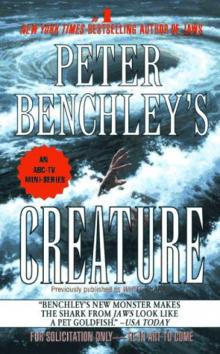 Peter Benchley's Creature
Peter Benchley's Creature The Island
The Island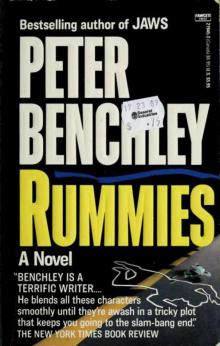 Rummies
Rummies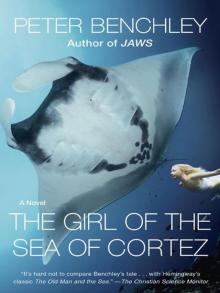 The Girl of the Sea of Cortez: A Novel
The Girl of the Sea of Cortez: A Novel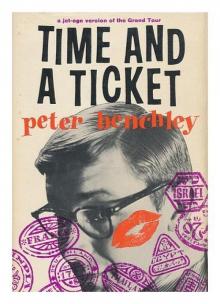 Time and a Ticket
Time and a Ticket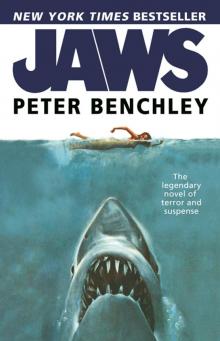 Jaws
Jaws The Deep
The Deep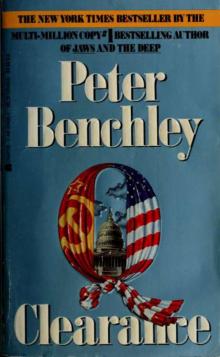 Q Clearance
Q Clearance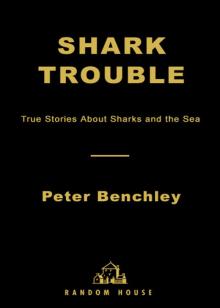 Shark Trouble: True Stories and Lessons About the Sea
Shark Trouble: True Stories and Lessons About the Sea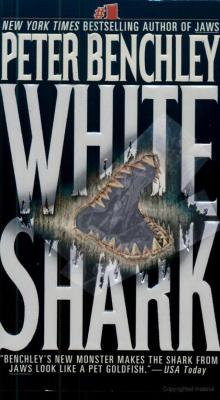 White Shark
White Shark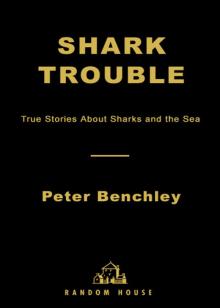 Shark Trouble
Shark Trouble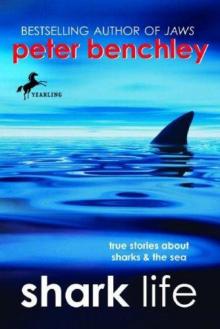 Shark Life: True Stories About Sharks & the Sea
Shark Life: True Stories About Sharks & the Sea